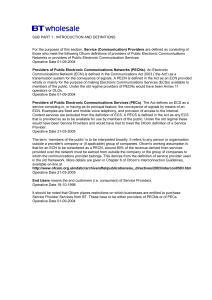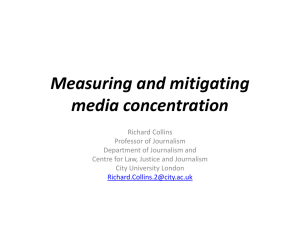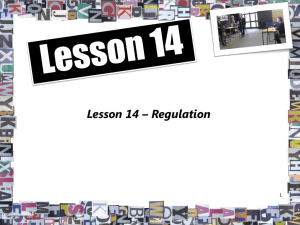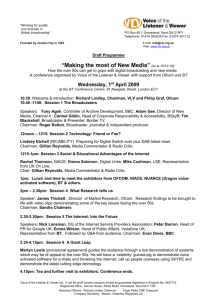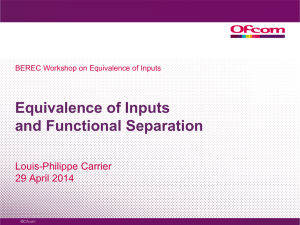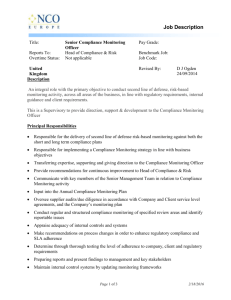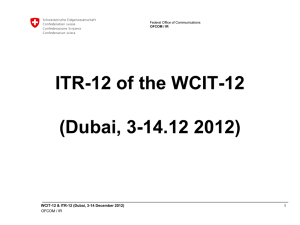Ofcom - IPPR
advertisement
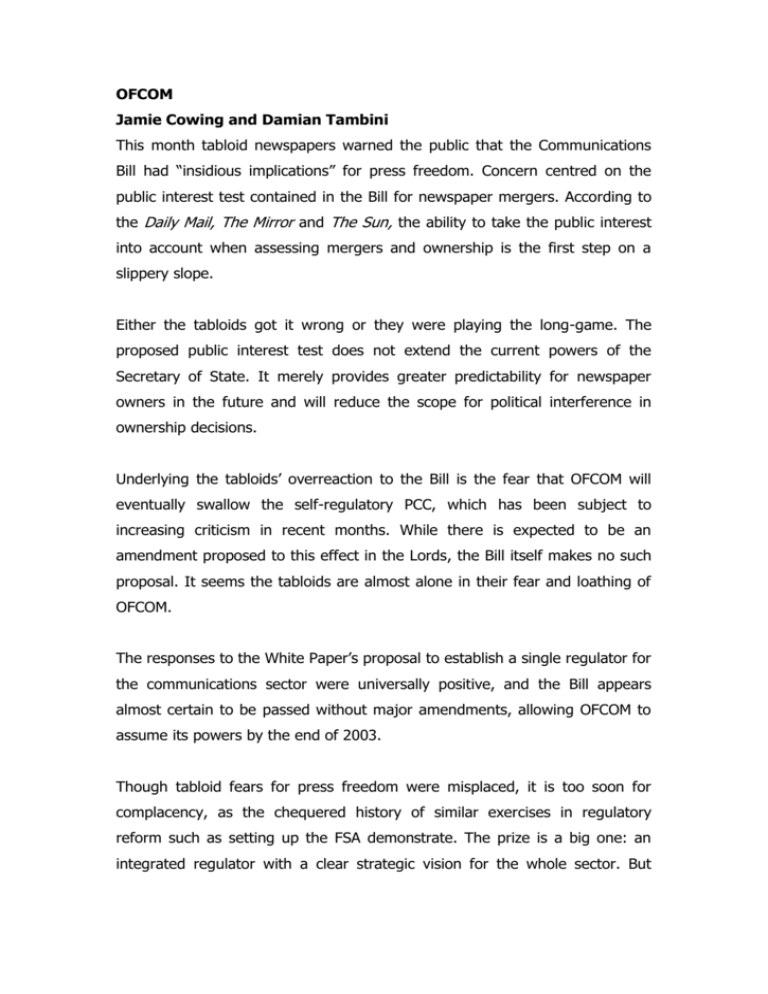
OFCOM Jamie Cowing and Damian Tambini This month tabloid newspapers warned the public that the Communications Bill had “insidious implications” for press freedom. Concern centred on the public interest test contained in the Bill for newspaper mergers. According to the Daily Mail, The Mirror and The Sun, the ability to take the public interest into account when assessing mergers and ownership is the first step on a slippery slope. Either the tabloids got it wrong or they were playing the long-game. The proposed public interest test does not extend the current powers of the Secretary of State. It merely provides greater predictability for newspaper owners in the future and will reduce the scope for political interference in ownership decisions. Underlying the tabloids’ overreaction to the Bill is the fear that OFCOM will eventually swallow the self-regulatory PCC, which has been subject to increasing criticism in recent months. While there is expected to be an amendment proposed to this effect in the Lords, the Bill itself makes no such proposal. It seems the tabloids are almost alone in their fear and loathing of OFCOM. The responses to the White Paper’s proposal to establish a single regulator for the communications sector were universally positive, and the Bill appears almost certain to be passed without major amendments, allowing OFCOM to assume its powers by the end of 2003. Though tabloid fears for press freedom were misplaced, it is too soon for complacency, as the chequered history of similar exercises in regulatory reform such as setting up the FSA demonstrate. The prize is a big one: an integrated regulator with a clear strategic vision for the whole sector. But reform processes are extremely complex, and the dangers of regulatory hiatus or a lack of legitimacy are constant. If there is a more general concern, it is that there is a real danger of a gap opening up between the rhetoric surrounding the “super” regulator and the reality. The Bill sets out four core objectives for OFCOM. Firstly, it will further the interests of consumers, where appropriate by promoting competition. Secondly, it will secure the optimal use of spectrum. Thirdly, it will secure the availability of a wide range of television and radio services of high quality and appeal to a variety of tastes and interests. Finally, it will secure high standards in all television and radio services. These core objectives are expanded upon in a further few hundred pages of legislation ranging from OFCOM’s duty to promote media literacy through the national curriculum, to the standards expected from the public service broadcasters. OFCOM has quickly become dubbed the new “super” regulator. And, while Lord Currie - OFCOM’s chair – may indeed be able to leap tall buildings in a single bound, a more realistic account of what OFCOM can achieve is needed. Thankfully, the first real indication of how the new regulator could achieve its aims was recently published in the form of Creating OFCOM, a consultants report on structure and internal organisation. OFCOM will have around 900 staff, a reduction of 200 on the total of the current regulators. The largest part of OFCOM will be the proposed Regulatory Policy and Compliance division. This will cover policy implementation, compliance and complex complaints. The consultants propose that the group should be divided into content and consumer protection, competition and markets and the allocation of scarce resources such as spectrum. A Regulatory Operations group will be the first point of contact for most customers and consumers. The Operations team will cover spectrum enforcement activity and will handle standard complaints and licence applications. The Strategy and Development team will provide the “strategic vision” for the agency and manage OFCOM’s international relations. The consultants reassure us that this will involve many stakeholders. Following criticism of the elitist makeup of the boards of previous regulators, we should expect to see international media moguls rubbing shoulders with cab drivers during consultation meetings, rather than just on the way home afterwards. OFCOM’s Governance is set out in statute. A Content Board chaired by Richard Hooper, the main board’s deputy chair, compliments the main board. The content board will deal with broadcast content regulation. A consumer panel will offer advice on consumer matters outside of content. The consultants recommend that OFCOM practices “risk-based regulation”. Risk-based regulation was developed in the nuclear industry and uses complicated formulae to assess the risk of failure in any one sector. This conjures up images of OFCOM’s finest mathematical brains developing algorithms to assess the chances of swearing before the watershed. It is more likely to mean that the regulator will attempt to see problems coming, for example new forms of market foreclosure, and devote resources appropriately, before they reach crisis. OFCOM’s sister “super” regulator, the Financial Services Authority (FSA), provides some clues as to the challenges ahead. The FSA was also welcomed as an opportunity to improve regulation in the financial sector by removing the often confusing, overlapping regulators and replacing them with a lean and mean super regulator. The FSA merged different regulators into a single organisation, bringing hundreds of staff together with the challenge of creating a new organisation and culture able to provide effective governance and support for a crucial sector of the economy. As the FSA has bravely pointed out, and events have proved, despite also practising risk-based regulation they could not ensure stakeholders that there would be a “zero failure state”. Cock-ups can and do occur. Good regulation can only ensure they happen on a less than before. There is a danger that OFCOM, like the Christmas turkey, will be better in the anticipation than the eating. The remaining debates on the Bill, and the early strategy of the regulator itself will be crucial for the entire communications sector in the UK. During the setting up of the FSA, the financial journalists gave the legislation a very effective airing in public. If the state of public debate on OFCOM consists only of weak claims of attacks on press freedom, it might be reasonable to say that the media are failing democracy – and their own industry. 1,008 words Jamie Cowling is a Research Fellow at the Institute for Public Policy Research Damian Tambini is a senior fellow at Oxford University


